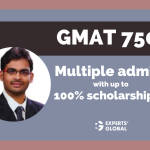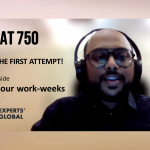Verbatim
Experts’ Global: Hi Jatin, thank you so much for interviewing with us today! May we request you to share your story in your own words?
Jatin: Of course! I completed the Chartered Accountant certification in 2014, and after having my own accounting practice for five years, I wished to use my financial acumen in a transition to consulting. To move into the consulting domain, I decided to pursue an MBA. Fast forward through my GMAT prep and the application process, assisted by MBA admissions consultants Experts’ Global, and today I hold offers from several business schools for their ’22 classes.
Experts’ Global: Your decision to affect a career shift is quite inspiring! In your opinion, what are the factors that made all the difference?
Jatin: Most importantly, you need to be absolutely sure that you want to pursue an MBA. In my case, leaving the established rhythm of professional life to go back to studying was a major call.
I would say that the pandemic coinciding with my MBA decision gave me a little more free time for research due to the remote work economy. Since the why behind your MBA is important to pin down, as it was for me, you need to spend some time clarifying your goals. Thereafter, start your applications work as early as you can.
Experts’ Global: Looking back, what are some mistakes you made along the way?
Jatin: My first mistake was taking the GMAT lightly. Looking at the material on the GMAT website and mba.com, I first felt that the test’s complexity was overhyped. I had taken a free GMAT practice test and done well on it, but when it came to the actual GMAT, my first attempt yielded a 570. That was the wake-up call for me to put my prep into overdrive.
The second mistake I made was thinking that I could tackle the entire process of school shortlisting, research, and application completion by myself. I am glad that I changed my approach eventually and reached out for Experts’ Global’s aid.
My third mistake was not crystalizing my post-MBA goals and MBA motivations early in the process. This was an error that reflected in how some of my essays did not reflect the utmost passion for a particular school or its offerings.
Experts’ Global: Regarding GMAT prep, what resources did you use and what advice do you have for the candidates?
Jatin: For the GMAT, after my initial dismal score of 570, I researched high-quality preparation programs. Finding out about Experts’ Global’s GMAT online course from a friend, I found its material to be exhaustive and its syllabus coverage to be holistic. The prep program also provided me with a study plan that gave greater direction to my self-study.
I would say that most people require around three months to prepare for the GMAT, and I followed this timeline for my second, more successful GMAT attempt. Some schools also ask for TOEFL scores, and I would recommend that one take the test around when one takes the GMAT. Since both exams have language-centric sections, it makes sense to get them both done close together.
Experts’ Global: What would you like to say about your experience with managing the application timeline?
Jatin: Indian applicants would do well to apply in the first two rounds of the MBA admissions cycle. This leaves them with enough time to complete visa formalities after getting into a business school. Also, by the time Round 3 rolls around, most schools have filled the majority of their MBA seats and are looking for very specific profiles to fit the remainder.
Complete your GMAT prep and get your target score as early as you can. Since Round 1 deadlines for MBAs are usually in September or October, you should give yourself around six months to complete your GMAT and optimize your applications. Start ramping up your GMAT studies in March or April, take a GMAT test series when you feel your prep is complete, and go on and ace the test well in time!
Experts’ Global: Can you describe your interview experience with the business schools?
Jatin: Interviews can often be quite intimidating in concept, but my experience has been that MBA interviews are very conversational. Most business schools have interview processes that interrogate who you are as a person and what your MBA motivations and financing sources are.
While I was equipped for these core queries by the Experts’ Global MBA interview preparation program, I also learned to make the interview process a two-way street. It is important to ask questions of your interviewers as well to reflect your interest in the business school in question.
Experts’ Global: What is your final message to all the GMAT and MBA aspirants reading this?
Jatin: As I said earlier, do not underestimate the difficulty of the GMAT. Start with your preparation as quickly as possible to figure out what your study timeline is going to be like. However, be aware that the GMAT is not the linchpin of a successful MBA application. All global business schools evaluate your profile holistically, so you should spend time figuring out what your USPs are. This self-evaluation must be done close to when you decide to go for an MBA!
Experts’ Global: Thank you for sharing so many of your insights with us, and all the best for your upcoming MBA journey!
Jatin: You are most welcome, and I hope my thoughts prove useful for other MBA aspirants!







